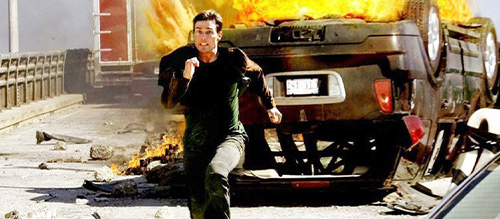Mission: Impossible Movies Ranked
The Mission: Impossible franchise was originally a television series in the late 1960s and early 1970s, but was conceptualised for cinema as an American answer to the long-term success (financial and cultural) of the James Bond 007 series and has since gone on to establish a legacy of its own. The Tom Cruise-fronted juggernaut has earned $3.5billion at the box office across seven theatrical releases since its inception in 1996, and has provided escapism to the masses for more than a generation of filmgoers.
With filmmakers as diverse in technique as Brad Bird, JJ Abrams, and Brian De Palma having helmed instalments over the years, and a range of reputable stars from Philip Seymour Hoffman to Simon Pegg having leant their hands to the franchise on the screen, this spy-turned-action series of globe-trotting films has offered fresh, exciting, heart-pounding moments time and time again.
Now one of the most successful spy-action franchises in the history of cinema, Mission: Impossible is undeniably a cultural touchstone. In this edition of Ranked, our mission (which we have chosen to accept) is to compare and contrast each Mission: Impossible movie and judge them in terms of artistry, cultural relevance, genre importance and popular consensus, to decide which franchise entry is the best and (first) which is the worst. These are the Mission Impossible Movies Ranked.
Follow @thefilmagazine on Twitter.
7. Mission: Impossible III (2006)
Featuring a script from the since maligned Roberto Orci (Transformers) and Alex Kurtzman (The Mummy, 2017) – “Humpty Dumpty sat on a wall” being perhaps the most poorly judged one liner in the franchise’s history – Mission: Impossible III committed perhaps the biggest faux pas of the series: it lacked originality. To get around some of the limitations of screenwriting for a spy thriller, the writers tacked new elements onto lead protagonist Ethan Hunt’s story and conveniently forgot about other aspects in order to establish forced anchors for emotion, though the narrative manipulation wasn’t cleverly disguised enough to be even close to as thrilling as the franchise’s best efforts.
On the screen, director JJ Abrams was unable to capture the urgency of the mystery that Brian De Palma had managed in the original film, nor the velocity of the action that John Woo had (for better or worse) presented in the sequel, while the barely passable script was a pit of expository dialogue and narrative convenience disguised by chopping the timeline up and offering a surprisingly strong action-focused third act. Philip Seymour Hoffman made mountains of gold from dirt here, but even a great screen actor like him was unable to overcome the limitations offered on the page.
Even so, the series’ trademarked high-octane stunt spectaculars remained, and in a number of aesthetically pleasing locations too – Toronto and Shanghai, to name just two. One sequence, involving Tom Cruise base jumping from a skyscraper in the dead of night was one of the franchise’s most memorable moments, and was arguably one of the reasons for Mission: Impossible – Ghost Protocol ever being green lit.
Recommended for you: J.J. Abrams Directed Movies Ranked


